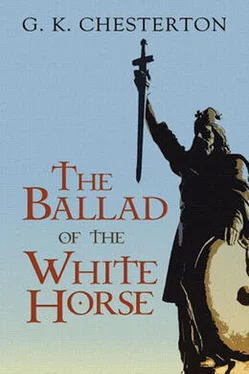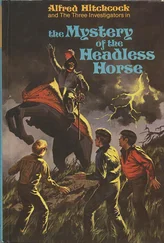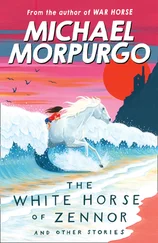Then the great statue on the shield
Looked his last look around
With level and imperial eye;
And Mark, the man from Italy,
Fell in the sea of agony,
And died without a sound.
And Ogier, leaping up alive,
Hurled his huge shield away
Flying, as when a juggler flings
A whizzing plate in play.
And held two arms up rigidly,
And roared to all the Danes:
"Fallen is Rome, yea, fallen
The city of the plains!
"Shall no man born remember,
That breaketh wood or weald,
How long she stood on the roof of the world
As he stood on my shield.
"The new wild world forgetteth her
As foam fades on the sea,
How long she stood with her foot on Man
As he with his foot on me.
"No more shall the brown men of the south
Move like the ants in lines,
To quiet men with olives
Or madden men with vines.
"No more shall the white towns of the south,
Where Tiber and Nilus run,
Sitting around a secret sea
Worship a secret sun.
"The blind gods roar for Rome fallen,
And forum and garland gone,
For the ice of the north is broken,
And the sea of the north comes on.
"The blind gods roar and rave and dream
Of all cities under the sea,
For the heart of the north is broken,
And the blood of the north is free.
"Down from the dome of the world we come,
Rivers on rivers down,
Under us swirl the sects and hordes
And the high dooms we drown.
"Down from the dome of the world and down,
Struck flying as a skiff
On a river in spate is spun and swirled
Until we come to the end of the world
That breaks short, like a cliff.
"And when we come to the end of the world
For me, I count it fit
To take the leap like a good river,
Shot shrieking over it.
"But whatso hap at the end of the world,
Where Nothing is struck and sounds,
It is not, by Thor, these monkish men
These humbled Wessex hounds—
"Not this pale line of Christian hinds,
This one white string of men,
Shall keep us back from the end of the world,
And the things that happen then.
"It is not Alfred's dwarfish sword,
Nor Egbert's pigmy crown,
Shall stay us now that descend in thunder,
Rending the realms and the realms thereunder,
Down through the world and down."
There was that in the wild men back of him,
There was that in his own wild song,
A dizzy throbbing, a drunkard smoke,
That dazed to death all Wessex folk,
And swept their spears along.
Vainly the sword of Colan
And the axe of Alfred plied—
The Danes poured in like a brainless plague,
And knew not when they died.
Prince Colan slew a score of them,
And was stricken to his knee;
King Alfred slew a score and seven
And was borne back on a tree.
Back to the black gate of the woods,
Back up the single way,
Back by the place of the parting ways
Christ's knights were whirled away.
And when they came to the parting ways
Doom's heaviest hammer fell,
For the King was beaten, blind, at bay,
Down the right lane with his array,
But Colan swept the other way,
Where he smote great strokes and fell.
The thorn–woods over Ethandune
Stand sharp and thick as spears,
By night and furze and forest–harms
Far sundered were the friends in arms;
The loud lost blows, the last alarms,
Came not to Alfred's ears.
The thorn–woods over Ethandune
Stand stiff as spikes in mail;
As to the Haut King came at morn
Dead Roland on a doubtful horn,
Seemed unto Alfred lightly borne
The last cry of the Gael.
Book VII:
Ethandune: The Last Charge
Away in the waste of White Horse Down
An idle child alone
Played some small game through hours that pass,
And patiently would pluck the grass,
Patiently push the stone.
On the lean, green edge for ever,
Where the blank chalk touched the turf,
The child played on, alone, divine,
As a child plays on the last line
That sunders sand and surf.
For he dwelleth in high divisions
Too simple to understand,
Seeing on what morn of mystery
The Uncreated rent the sea
With roarings, from the land.
Through the long infant hours like days
He built one tower in vain—
Piled up small stones to make a town,
And evermore the stones fell down,
And he piled them up again.
And crimson kings on battle–towers,
And saints on Gothic spires,
And hermits on their peaks of snow,
And heroes on their pyres,
And patriots riding royally,
That rush the rocking town,
Stretch hands, and hunger and aspire,
Seeking to mount where high and higher,
The child whom Time can never tire,
Sings over White Horse Down.
And this was the might of Alfred,
At the ending of the way;
That of such smiters, wise or wild,
He was least distant from the child,
Piling the stones all day.
For Eldred fought like a frank hunter
That killeth and goeth home;
And Mark had fought because all arms
Rang like the name of Rome.
And Colan fought with a double mind,
Moody and madly gay;
But Alfred fought as gravely
As a good child at play.
He saw wheels break and work run back
And all things as they were;
And his heart was orbed like victory
And simple like despair.
Therefore is Mark forgotten,
That was wise with his tongue and brave;
And the cairn over Colan crumbled,
And the cross on Eldred's grave.
Their great souls went on a wind away,
And they have not tale or tomb;
And Alfred born in Wantage
Rules England till the doom.
Because in the forest of all fears
Like a strange fresh gust from sea,
Struck him that ancient innocence
That is more than mastery.
And as a child whose bricks fall down
Re–piles them o'er and o'er,
Came ruin and the rain that burns,
Returning as a wheel returns,
And crouching in the furze and ferns
He began his life once more.
He took his ivory horn unslung
And smiled, but not in scorn:
"Endeth the Battle of Ethandune
With the blowing of a horn."
On a dark horse at the double way
He saw great Guthrum ride,
Heard roar of brass and ring of steel,
The laughter and the trumpet peal,
The pagan in his pride.
And Ogier's red and hated head
Moved in some talk or task;
But the men seemed scattered in the brier,
And some of them had lit a fire,
And one had broached a cask.
And waggons one or two stood up,
Like tall ships in sight,
As if an outpost were encamped
At the cloven ways for night.
And joyous of the sudden stay
Of Alfred's routed few,
Sat one upon a stone to sigh,
And some slipped up the road to fly,
Till Alfred in the fern hard by
Set horn to mouth and blew.
Читать дальше












